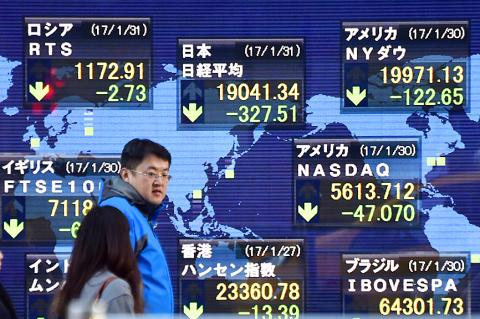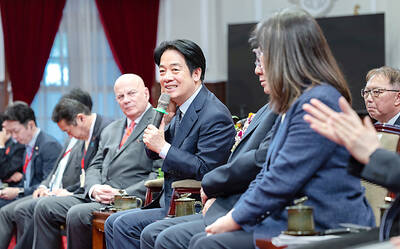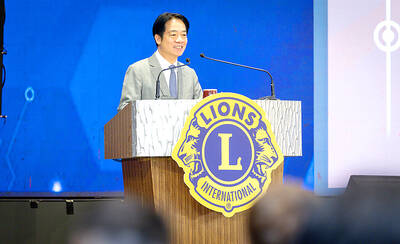The US dollar yesterday headed for its worst start to a year since 2008 while world stock losses, already the biggest in six weeks, grew after widespread protests against US President Donald Trump’s stringent curbs on travel to the US.
Investors’ hopes for a fiscal boost to the world’s largest economy under Trump have been tempered by controversial and protectionist policies that have seen him suspend travel to the US from seven Muslim-majority countries.
Thousands took to the streets of major US cities to oppose the travel ban, which also halts refugee arrivals, while marches in Britain added to pressure on British Prime Minister Theresa May to cancel a planned state visit by Trump.

Photo: AFP
A stream of US policymakers and business executives have also slammed Trump’s stance.
“Investors are becoming worried as it appears as if he was setting fire to geopolitical risks that already exist,” JPMorgan Asset Management global market strategist Yoshinori Shigemi said.
The US dollar edged down against a basket of six major currencies, on track for a 1.9 percent fall this month — its worst start to the year since the 2008 financial crisis.
MSCI’s gauge of the world’s 46 stock markets yesterday lost a further 0.1 percent, adding to a 0.6 percent fall on Monday, which was its largest loss in a month and a half.
“His actions over the last few days is another reminder that there were two sides to his campaign and Trump is just as adamant to follow through on those measures that will likely weigh on market sentiment in the coming months,” OANDA senior market analyst Craig Erlam said.
Eurozone government bond yields edged higher on better-than-expected French and Spanish inflation data for last month.
European bourses clawed back some ground after big losses on Monday after strong results from the likes of British online supermarket Ocado.
MSCI’s broadest index of Asia-Pacific shares outside Japan fell 0.6 percent while Japan’s Nikkei dropped 1.7 percent, its biggest fall in almost three months.
MSCI’s ex-Japan Asian shares index was up 5.7 percent this month, while its index of world markets was up 2.5 percent. They were also higher than their levels before the US election.
Sydney shed 0.7 percent and Seoul sank 0.8 percent.
Singapore, Wellington, Manila and Kuala Lumpur were also sharply lower, while Taipei, Hong Kong and Shanghai were closed for the Lunar New Year holidays.
Against the yen, the US dollar fell a further 0.3 percent to ¥113.49. It was down 3.1 percent last month, after three straight months of sizable gains.
The yen showed no reaction after the Bank of Japan kept policy on hold, as expected.
A string of recent data has suggested the Japanese economy is slowly regaining traction.
The US Federal Reserve, which started its two-day policy meeting yesterday, was widely expected to keep interest rates unchanged as it awaits greater clarity on Trump’s economic policies.

Two US House of Representatives committees yesterday condemned China’s attempt to orchestrate a crash involving Vice President Hsiao Bi-khim’s (蕭美琴) car when she visited the Czech Republic last year as vice president-elect. Czech local media in March last year reported that a Chinese diplomat had run a red light while following Hsiao’s car from the airport, and Czech intelligence last week told local media that Chinese diplomats and agents had also planned to stage a demonstrative car collision. Hsiao on Saturday shared a Reuters news report on the incident through her account on social media platform X and wrote: “I

‘BUILDING PARTNERSHIPS’: The US military’s aim is to continue to make any potential Chinese invasion more difficult than it already is, US General Ronald Clark said The likelihood of China invading Taiwan without contest is “very, very small” because the Taiwan Strait is under constant surveillance by multiple countries, a US general has said. General Ronald Clark, commanding officer of US Army Pacific (USARPAC), the US Army’s largest service component command, made the remarks during a dialogue hosted on Friday by Washington-based think tank the Center for Strategic and International Studies. Asked by the event host what the Chinese military has learned from its US counterpart over the years, Clark said that the first lesson is that the skill and will of US service members are “unmatched.” The second

STANDING TOGETHER: Amid China’s increasingly aggressive activities, nations must join forces in detecting and dealing with incursions, a Taiwanese official said Two senior Philippine officials and one former official yesterday attended the Taiwan International Ocean Forum in Taipei, the first high-level visit since the Philippines in April lifted a ban on such travel to Taiwan. The Ocean Affairs Council hosted the two-day event at the National Taiwan University Hospital International Convention Center. Philippine Navy spokesman Rear Admiral Roy Vincent Trinidad, Coast Guard spokesman Grand Commodore Jay Tarriela and former Philippine Presidential Communications Office assistant secretary Michel del Rosario participated in the forum. More than 100 officials, experts and entrepreneurs from 15 nations participated in the forum, which included discussions on countering China’s hybrid warfare

MORE DEMOCRACY: The only solution to Taiwan’s current democratic issues involves more democracy, including Constitutional Court rulings and citizens exercising their civil rights , Lai said The People’s Republic of China (PRC) is not the “motherland” of the Republic of China (ROC) and has never owned Taiwan, President William Lai (賴清德) said yesterday. The speech was the third in a series of 10 that Lai is scheduled to deliver across Taiwan. Taiwan is facing external threats from China, Lai said at a Lions Clubs International banquet in Hsinchu. For example, on June 21 the army detected 12 Chinese aircraft, eight of which entered Taiwanese waters, as well as six Chinese warships that remained in the waters around Taiwan, he said. Beyond military and political intimidation, Taiwan